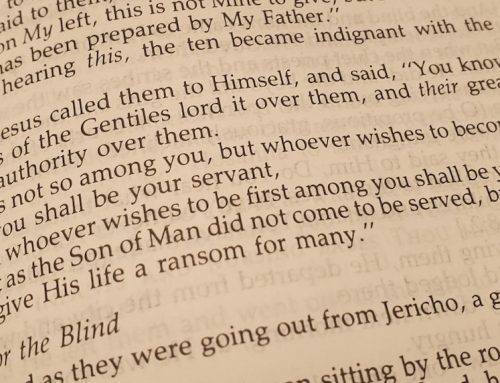I get a lot of questions from people about how best to have a relationship with those still in the Stanton churches. Many feel castigated and judged after leaving, whether they left for Biblically principled reasons, or because they were running from the mistaken view of God they had been told about by Stanton, and wanted nothing to do with him.
What a shame, either way. The dysfunction that has arisen in so many families as a result of Stanton has been written about extensively in these pages and in readers’ comments. It’s truly an awful legacy, considering that the family unit was designed by God to be a beautiful thing, something that protects and nurtures children’s and spouses’ faith in God.
Nevertheless, many find themselves on the outside of Stanton for a multitude of reasons, and wonder if there is any hope to patch up relationships with those who remain on the inside. Is it possible? Is it worth it? I hold the view that all relationships are worth it, but if so, how does one go about it? Many have written me expressing how hopeless it all seems.
Hopeless may seem accurate if the only goal is to get the person who is still in, out. While I make no pretense that that is a worthy goal in most cases (because those “in” will see and relate to God so much better from outside of Stanton’s darkened view of God), that is the wrong objective to measure success from a relationship point of view. We can’t hold the relationship hostage until they leave.
So the real question is how can we relate to those still inside? How do we deal with strong differences of opinion, especially at family gatherings like meals (particularly when there are withdrawn-from family members present) and weddings (where alcohol might be served).
Is it possible for people who strongly disagree with each other to not just be cordial, but to genuinely love each another as Jesus loved? If Jesus’ kind of love is truly a command, not just some sort of warm fuzzy feeling, then yes, we can. If love is a command, it’s something we have complete control over. God can’t command something that is impossible for us to do.
This means disapproval can coexist in a loving relationship. We know this to be true from life experiences. Can’t siblings love each other in spite of their different choices in life? Can’t parents and adult children love each other in spite of differences in their opinions and choices with regard to church, faith, or anything else? Can’t spouses do the same?
I know some of you will shake your heads in disbelief. “Well, that may be a good theory, but I’ve never seen it happen in real life–at least not in my family.” My point exactly. Maybe the real problem is that you haven’t actually seen Jesus’ love preached or lived out in real life, but I’m here to tell you, it can be done. Whether you are currently a believer or not, you have the ability to model the way forward for your family. Become a believer, set your life on fire for Jesus Christ, and the task at hand will become much more clear.
The scriptures command this kind of love for those we don’t understand, or that we have conflicts with, and we are to follow this command above all else. It is our highest calling, above even going to church. If love demands you help someone stuck on the side of the road next Sunday on your way to church, that’s what you should do, even it makes you late. Or, you can be the priest with your nose in the air who walks by on the other side of the road, driving right past a golden opportunity to demonstrate love in action.
The Greatest Commands are to Love God with all your heart, soul and mind, and love your neighbor–and by extension, your father, or daughter, or son, or mother, or husband, or wife–as yourself. That’s not a theory, it’s a life-altering call to action–an deliberate reinvention of each relationship from the ground up. It is simultaneously the easiest and the hardest thing you will ever do. Love comes easy because we’re made in the image of a God whose nature is love. But it’s hard because we want to make all kinds of excuses why we can’t, or shouldn’t, or don’t need to really love THIS person THAT much.
I may not like someone’s behavior, or opinions, or choices, or church, but I can still love them deeply, and display that love genuinely through my actions, words, and demeanor. It doesn’t mean I approve of all of the above. It means I love them in spite of it. Wasn’t that what Jesus did while associating with the publicans, sinners, tax collectors and prostitutes–those outside the outer circles of the spiritual in-crowd?
Jesus didn’t give his stamp of approval to the “riffraff” of society when he socialized with them. He got to know them as real people, with real hurts, habits, and hangups. He didn’t wring his hands in fear that eating and drinking with them would be seen as an endorsement of their messed up lives, although the Pharisees dutifully accused him of exactly that. No, man-fearing was definitely not top-of-mind. Instead, the “riffraff” felt Jesus’ love for them, not his judgement. In fact, his most fiery judgment was reserved for the most hypocritical teachers of the law, the upper echelon of the religious hierarchy of his day. Things haven’t changed much, have they?
Are there times when we may need to show some righteous indignation, or at least put some firm boundaries down about what will or won’t happen in our own family unit? Sure, but remember that Jesus had the confidence of knowing everyone’s heart. We don’t. We should always assume good motives, and that will tend to soften our words a bit. A little humility goes a long way.
Jesus’ kind of love–the kind that forgives old hurts, recognizes failures, and loves anyway–is the kind that fathers and daughters can tap into to rebuild a strained relationship, or mothers and daughters can use to heal old wounds. Sons can tap into this Jesus-kind-of-love, even after years of drifting away from their fathers, whether that was because of the natural forces of their teen quest for independence, matched up against a father’s need for authority and respect in his home, or because of hardened, unloving church teaching and discipline. Love conquers all, and yes, it covers–overlooks–a multitude of sins. It is not our role to mete out justice to those who have wronged us. That’s above our pay grade.
1 Peter 4:8 – Above all, love each other deeply, because love covers over a multitude of sins.
And everyone has them, don’t they? Father, son, mother, daughter, in the church, or out of the church, all have sinned and fallen short of the glory of God.
You want to know the secret to reconciling sinful people in messed up families? The humility to recognize that we’re all in the same boat. We all stand condemned, and thus are all equally in need of God’s grace, from those who get all spiritual to those who rarely set foot in a church building. The minute I start demanding that you be held accountable for all you’ve done wrong, I have to see clearly before me how I’ve done wrong and need just as much grace and forgiveness as you do. The humility that washes over us when we realize our own shortcomings is the beginning of rebuilding a relationship on mutual love and understanding.
If you have a relationship with someone in Stanton, take heart and don’t throw it away just because they may not agree with your decision not to attend. Even if they don’t treat you very lovingly when you express your disagreement, that’s OK. Love them anyway. Show them Jesus’ love in action. Model the right way to live a life of love for those we disagree with, and show them a better way.






We have been studying 1 John on Sunday morning and it is all about loving your neighbor as yourself, I think this applies to those of us who have family still in Stanton. If I can love a neighbor like this, then my family should come easily. Sometimes, this is really hard for me and I keep in prayer that through my actions and love, they will see that I am not so different than them, just that I disagree with what they teach and how they treat family compared to their church family.
Yes, 1 John is rich on the subject of love. Romans 14 and 15 are also good to remind me that believers can coexist peacefully with vastly different opinions.
Kevin, as I talk to some of the young people who were raised in the church and left, they DO face this issue of trying to live peaceably with Stanton family members but I must say- this issue SHOULD BE worked on from BOTH SIDES. Unfortunately many Stanton brethren are too judgemental to condescend. I agree that we must do all we can to show them a difference concerning unconditional love. In my marriage many years ago I took a stand to NEVER give my husband the 'SILENT TREATMENT'. I haven't since that day.( I do have to admit there… Read more »
Yes, it should be worked at from both sides, and honestly, I've seen progress in that regard in my own family. I don't at all want to leave the impression that Stanton members are **always** unloving toward ex-members. That would be completely unfair and untrue. Sometimes judgmental and condescending, maybe, and I believe there is still some of what I would consider gossip and slander within the church shortly after someone leaves. But even that may vary greatly from congregation to congregation. I have seen a lot of improvement on what used to be a pretty consistently abrasive attitude toward… Read more »
The worst habit I picked up from my time in "the one true church" was a short temper. I was in three weeks when my first teaching preacher started yelling at me. It took seven years after leaving "the one true church" for me to overcome my short temper. I tried many different things in the area of self control none of which worked until I finally asked God one day "why so i have a short temper?" God gave me understanding that it was my first teaching preacher who led me astray. He had a fuse of about three… Read more »
Love overcomes all, love is the most important aspect of Christianity, because without it all other righteousness is of no use. To love God and to love others is our calling. Our neighbor happens to be the worst sinners as Jesus illustrated with his story of the Good Samaritan. The man beaten and robbed is no other than the sinner today who is imprisoned by their homosexuality, alcoholism, drug addiction, porn addiction, prostitution, gossiping, lying, stealing, cheating, and any other sin. For sin hurts no one as bad as it hurts the person committing it. If we were to look… Read more »
Imagine and dream of a church where sinners, used, abused, and cruelly beaten by their sins and the world were loved in the church and transformed their lives. Imagine former porn stars becoming faithful devoted wives and making loving mothers, and teaching younger women how to love their husbands. Imagine prostitutes, much like Rahab, turning their lives around. Imagine them being healed and helping others to heal. Imagine porn addicts, turning their lives around and becoming strong and mighty men who help other men out of the trap they once were snared in. Imagine alcoholics, learning to lay aside the… Read more »
Forgiveness To err is human to forgive is divine. Nothing makes us more like God than when we forgive, and we are not to wait until others ask our forgiveness. It is good when a soul is contrite and asks our forgiveness, but there is no way I am going to wait until people feel like asking me for forgiveness for me to forgive them. No I will forgive immediately. A huge root of the problem in Stanton is a lack of forgiveness. Teachers feel they are still bearing the effects of their past sins, and since they do not… Read more »
Martin Luther- this writing is beautiful! It is exactly what we all need to hear! I pray The Stanton churches can reach out to God and achieve this.
Can I share this? And the one after this? I know that many people would be touched by this, as it touched me.
I learned this morning that one of the women who was ministered to by the "Jericho Project" chose to turn her life over to God. This brought joy to my heart because I know that the Angels in Heaven did the same.
Certainly Donna, the poems are not mine, but here is a link to where they all can be found. Certainly, also, the link I will post has them to tunes, which adds more to the inspiring message. http://www.friendsacrossamerica.com/inspire.html.
Thank you, Donna
Why not view mistakes as the teachers to become successful? Why not view sins as some of our greatest teachers? If At First You Don't Succeed….~~ Author Unknown~~ Failure doesn't mean – "You are a failure," It means – You have not succeeded. Failure doesn't mean – "You accomplished nothing," It means – You have learned something. Failure doesn't mean – "You have been a fool," It means – You had a lot of faith. Failure doesn't mean – "You don't have it," It means – You were willing to try. Failure doesn't mean – "You are inferior," It means… Read more »
Is not this a greater way to correct someone than to make them feel inferior for the rest of their lives because of a sin they are ashamed of?Don't Punish Every Mistake In one of my assignments as a young infantry officer, I was sent to the 48th Infantry near Frankfort, Germany. In those days our prize weapon was a huge 280-mm atomic cannon. Guarded by infantry platoons, these guns were hauled around the forests on trucks to keep the Soviets from guessing their location. One day Captain Tom Miller assigned my platoon to guard a 280. I alerted my… Read more »
If we forgive as God forgives, always hoping the other person will repent, there would be greater results. I remember one deeply rooted sin that I had. It stayed in my life for a long time, 23 years to be exact. It wasn't until a woman I deeply loved wept when she learned of it that it awoke something in my soul that finally said no more. From that day forward the prison crumbled, and I emerged freed from a slavery that had hurt me greatly. I remember a story Gandhi told, he had disobeyed his father, and went to… Read more »
In your patience ye possess your souls, and we are to forgive seventy times seven, and a just man falls seven times and rises up again, and if we confess our sins, he is faithful and just to forgive us our sins and to cleanse us from ALL unrighteousness, that is what the Bible reads, but the Stanton Church of Christ is possessed with the idea that if you fall into certain sins, a dozen times, they can diagnose you as having lost your mind. I know if I post a quote by someone in the world, particularly someone financially… Read more »